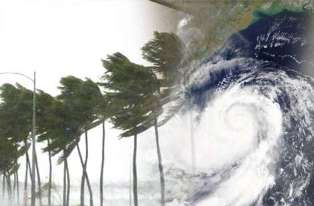Apart from the destruction that is being made on earth by the manmade disasters. There are also natural disasters which are trying to hit our country and the whole world to create some destruction. Natural disasters as the name suggest is a very well-known mode of destruction by Mother Nature. And today in this article we will try to talk to you about one such disaster known as the cyclone. This cyclone is named as Bulbul which is trying to create destruction in the lifestyle of the people of West Bengal. Today, we will share with you every detail about cyclone Bulbul and about the high alert location where it can hit.
Table of Contents
Where Cyclone Bulbul Arrived?
After you hear the word cyclone, the first and the foremost thought that comes to our mind is what are cyclones. The cyclone is a series of wind that has been trapped in a tornado kind of shape which can create havoc on earth. The power of a cyclone depends on the creation and speed of the wind that it is surrounded by. So every cyclone varies from shapes and sizes and power. Also, their destruction depends upon their power. Cyclones maley emerge from oceans. It is also said that the cyclones from Bay Of Bengal are the most disastrous from all.
Cyclone Bulbul
Cyclone Bulbul was the strongest cyclone that has ever hit Northern India. It originated from the remnants of the Severe Tropical Storm Matmo over the southern Bay of Bengal. Cyclone Bulbul was originating in early November but the power slowly develop its way in that cyclone on 7th to 8th November. Thus, finally on 9th November, it hit West Bengal and then further get into the direction of Bangladesh. If we believe the sources then it is said that heavy havoc has been created at both the location.
Impact Of Cyclone Bulbul
The main impact of cyclone Bulbul was seen in West Bengal state that is the nearest state to the Bay Of Bengal from which the cyclone originated and came from. Although from the relating states heavy rainfall was recorded. First when cyclone Bulbul arrived West Bengal it made landfall around the Sunderban Dhanchi forest. Also, extremely heavy rain and winds of up to 135 km/h (85 mph) across much of the southern portion of the state were also recorded by the concerned authorities.
Death Records
Although in the Odisha state which is a relating state of West Bengal no records have been come out. Yet some are severely injured but no one is dead till now. But in West Bengal State some casualties have been reported by the concerned authority and reliable sources such as :-
- 10 deaths due to landslides.
- 4 deaths due to uprooted trees.
- 1 due to electrocuted.
- 1 due to collapsed wall.
Aftermath Of The Destruction
Although many people were evacuated even before Cyclone Bulbul hit West Bengal but as we all know that some destruction has bound to happen. So many trees have been uprooted from their original location and are on the roads and the streets. The concerned authorities of West Bengal State have been doing its work for the betterment of the people who were evacuated and are giving them their houses back. They are also taking care of the trees that has been lying around across the street so that no accident and mishap should take place because of them.
Precautions To Be Taken In A Cyclone
When a cyclone hit your area the following precautions should be taken by the local people so there is no harm and mishaps happening to any locals:-
- First of all, cut off all the electricity supply to prevent shocks.
- Also disconnect all electrical appliances.
- For updates, listen to your battery radio or any other means without electricity.
- Stay inside and in the shelter.
- Do not stand near the windows.
- Stand mainly in the strongest part of the building such as –
- Cellar
- Internal hallway
- Bathroom
- Keep evacuation and emergency kits with you for any mishap.
- If the building starts to collapse protect yourself with mattresses, rugs or blankets.
- You can also take shelter under a strong table or bench or hold onto a solid fixture, e.g. a water pipe.
- Even if the wind drops the cyclone is not exactly over so, stay inside.
- Wait for the official all clear sign by the concerned authorities.
